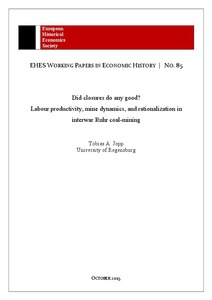Did closures do any good? Labour productivity, mine dynamics, and rationalization in interwar Ruhr coal-mining
"Over the later 1920s and up to the mid-1930s, German coal-mining saw an exceptional surge in labour productivity led primarily by the Ruhr coalminesÕ performance. It is a commonly accepted view that the economy-wide Ôrationalization boomÕ between currency stabilization and the depression years...
| Main Authors: | , |
|---|---|
| Institution: | ETUI-European Trade Union Institute |
| Format: | TEXT |
| Language: | English |
| Published: |
London
2015
EHES |
| Subjects: | |
| Online Access: | https://www.labourline.org/KENTIKA-19109467124919276499-Did-closures-do-any-good?-Labo.htm |
| _version_ | 1771659899600633856 |
|---|---|
| author | Jopp, Tobias A. Uebele, Martin |
| author_facet | Jopp, Tobias A. Uebele, Martin |
| collection | Library items |
| description | "Over the later 1920s and up to the mid-1930s, German coal-mining saw an exceptional surge in labour productivity led primarily by the Ruhr coalminesÕ performance. It is a commonly accepted view that the economy-wide Ôrationalization boomÕ between currency stabilization and the depression years explains that pattern. We test the related hypothesis that Ônegative rationalizationÕ in the form of a massive wave of mine closures over 1924-29 played a significant role in pushing aggregate labour productivity in the Ruhr coal district up to new levels. Based on an original dataset on the population of Ruhr coalmines, the sources of productivity change over the extended period 1913-38 are identified using the decomposition method of Foster, Haltiwanger and Krizan (2001). Results suggest that labour productivity in Ruhr coal-mining was driven to a large extent by improvements at individual mines attributable to the intensified mechanization of underground operations. Closures regularly raised aggregate productivity in the year after the closure had been conducted; closures also pushed productivity by way of ceding resources to high(er) productivity surviving mines over gradual shut-down. However, on the whole, turnover-effects were marginal compared to the effects stemming from the producer dynamics among surviving mines. Thus, the practical productivity implications of mine closures over the rationalization boom are negligible and still overrated in the relevant literature. These findings call for testing more rigorously the relative importance of Ônegative rationalizationÕ in the form of plant closures in other branches of the Weimar economy." |
| format | TEXT |
| geographic | Germany |
| id | 19109467124919276499_a4e001f5bf9e4a80ba802ad167dc2d5a |
| institution | ETUI-European Trade Union Institute |
| is_hierarchy_id | 19109467124919276499_a4e001f5bf9e4a80ba802ad167dc2d5a |
| is_hierarchy_title | Did closures do any good? Labour productivity, mine dynamics, and rationalization in interwar Ruhr coal-mining |
| language | English |
| physical | 46 p. Digital |
| publishDate | 2015 |
| publisher | London EHES |
| spellingShingle | Jopp, Tobias A. Uebele, Martin coal mining history labour productivity plant shutdown Did closures do any good? Labour productivity, mine dynamics, and rationalization in interwar Ruhr coal-mining |
| thumbnail | https://www.labourline.org/Image_prev.jpg?Archive=107712492599 |
| title | Did closures do any good? Labour productivity, mine dynamics, and rationalization in interwar Ruhr coal-mining |
| topic | coal mining history labour productivity plant shutdown |
| url | https://www.labourline.org/KENTIKA-19109467124919276499-Did-closures-do-any-good?-Labo.htm |

